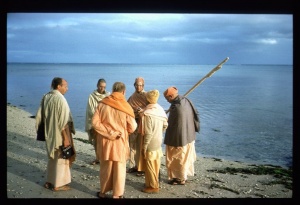CC Madhya 23.105: Difference between revisions
m (1 revision(s)) |
(No difference)
|
Revision as of 16:02, 20 March 2008

A.C. Bhaktivedanta Swami Prabhupada
TEXT 105
yukta-vairāgya-sthiti saba śikhāila
śuṣka-vairāgya-jñāna saba niṣedhila
SYNONYMS
yukta-vairāgya—of proper renunciation; sthiti—the situation; saba—all; śikhāila—instructed; śuṣka-vairāgya—dry renunciation; jñāna—speculative knowledge; saba—all; niṣedhila—forbade.
TRANSLATION
Śrī Caitanya Mahāprabhu then told Sanātana Gosvāmī about proper renunciation according to a particular situation, and the Lord forbade dry renunciation and speculative knowledge in all respects.
PURPORT
This is the technique for understanding śuṣka-vairāgya and yukta-vairāgya. In the Bhagavad-gītā (BG 6.17) it is said:
- yuktāhāra-vihārasya yukta-ceṣṭasya karmasu
- yukta-svapnāvabodhasya yogo bhavati duḥkha-hā
“He who is temperate in his habits of eating, sleeping, recreation and work can mitigate all material pains by practicing the yoga system.” To broadcast the cult of Kṛṣṇa consciousness, one has to learn the possibility of renunciation in terms of country, time and candidate. A candidate for Kṛṣṇa consciousness in the Western countries should be taught about the renunciation of material existence, but one would teach candidates from a country like India in a different way. The teacher (ācārya) has to consider time, candidate and country. He must avoid the principle of niyamāgraha—that is, he should not try to perform the impossible. What is possible in one country may not be possible in another. The ācārya’s duty is to accept the essence of devotional service. There may be a little change here and there as far as yukta-vairāgya (proper renunciation) is concerned. Dry renunciation is forbidden by Śrī Caitanya Mahāprabhu, and we have also learned this from our spiritual master, His Divine Grace Bhaktisiddhānta Sarasvatī Ṭhākura Gosvāmī Mahārāja. The essence of devotional service must be taken into consideration, and not the outward paraphernalia.
Sanātana Gosvāmī wrote his Vaiṣṇava smṛti, Hari-bhakti-vilāsa, which was specifically meant for India. In those days, India was more or less following the principle of smārta-vidhi. Śrīla Sanātana Gosvāmī had to keep pace with this, and his Hari-bhakti-vilāsa was compiled with this in mind. According to smārta-brāhmaṇas, a person not born in a brāhmaṇa family could not be elevated to the position of a brāhmaṇa. Sanātana Gosvāmī, however, says in the Hari-bhakti-vilāsa (2.12) that anyone can be elevated to the position of a brāhmaṇa by the process of initiation.
yathā kāñcanatāṁ yāti kāṁsyaṁ rasa-vidhānataḥ tathā dīkṣā-vidhānena dvijatvaṁ jāyate nṛṇām “As bell metal is turned to gold when mixed with mercury in an alchemical process, so one who is properly trained and initiated by a bona fide spiritual master immediately becomes a brāhmaṇa.” There is a difference between the smārta process and the gosvāmī process. According to the smārta process, one cannot be accepted as a brāhmaṇa unless he is born in a brāhmaṇa family. According to the gosvāmī process, the Hari-bhakti-vilāsa and the Nārada-pañcarātra, anyone can be a brāhmaṇa if he is properly initiated by a bona fide spiritual master. This is also the verdict of Śukadeva Gosvāmī in Śrīmad-Bhāgavatam (SB 2.4.18):
- kirāta-hūṇāndhra-pulinda-pulkaśā
- ābhīra-śumbhā yavanāḥ khasādayaḥ
- ye ‘nye ca pāpā yad-apāśrayāśrayāḥ
- śudhyanti tasmai prabhaviṣṇave namaḥ
“Kirātas, Hūṇas, Āndhras, Pulindas, Pulkaśas, Ābhīras, Śumbhas, Yavanas and members of the Khasa races, and even others who are addicted to sinful acts, can be purified by taking shelter of the devotees of the Lord, due to His being the supreme power. I beg to offer my respectful obeisances unto Him.” A Vaiṣṇava is immediately purified, provided he follows the rules and regulations of his bona fide spiritual master. It is not necessary that the rules and regulations followed in India be exactly the same as those in Europe, America and other Western countries. Simply imitating without effect is called niyamāgraha. Not following the regulative principles but instead living extravagantly is also called niyamāgraha. The word niyama means “regulative principles,” and āgraha means “eagerness.” The word agraha means “not to accept.” We should not follow regulative principles without an effect, nor should we fail to accept the regulative principles. What is required is a special technique according to country, time and candidate. Without the sanction of the spiritual master, we should not try to imitate. This principle is recommended here: śuṣka-vairāgya-jñāna saba niṣedhila. This is Śrī Caitanya Mahāprabhu’s liberal demonstration of the bhakti cult. We should not introduce anything whimsically, without the sanction of the bona fide spiritual master. In this connection, Śrīla Bhaktisiddhānta Sarasvatī Ṭhākura comments on these points by quoting two verses by Śrī Rūpa Gosvāmī (Bhakti-rasāmṛta-sindhu 1.2.255-256).
anāsaktasya viṣayān yathārham upayuñjataḥ nirbandhaḥ kṛṣṇa-sambandhe yuktaṁ vairāgyam ucyate prāpañcikatayā buddhyā hari-sambandhi-vastunaḥ mumukṣubhiḥ parityāgo vairāgyaṁ phalgu kathyate “When one is not attached to anything but at the same time accepts everything in relation to Kṛṣṇa, one is rightly situated above possessiveness. On the other hand, one who rejects everything without knowledge of its relationship to Kṛṣṇa is not as complete in his renunciation.” To preach the bhakti cult, one should seriously consider these verses.